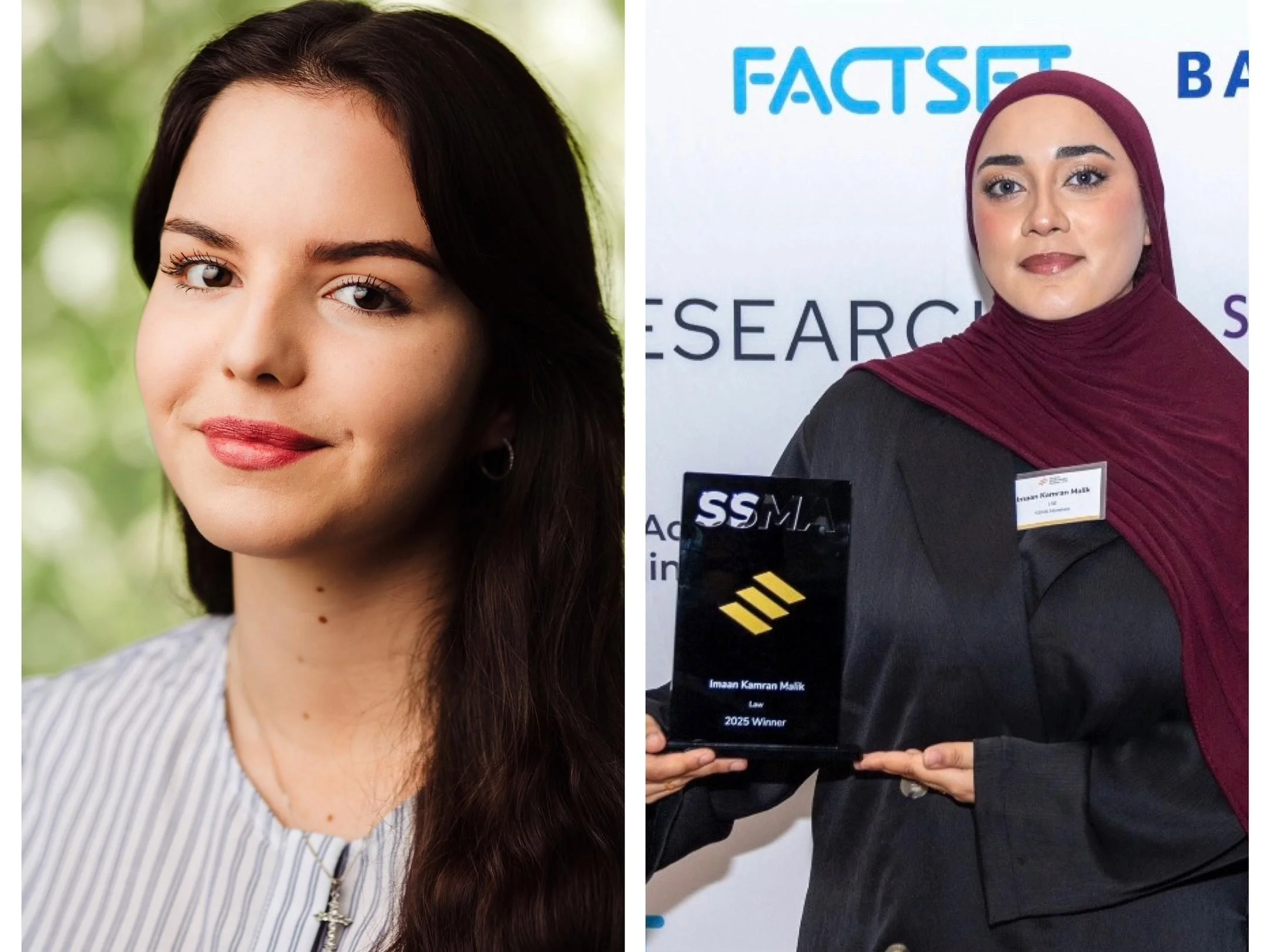Recent LSE graduates recognised at social mobility awards

Two recent LSE graduates, Gracie Coulwill and Imaan Kamran Malik, have been recognised at the Student Social Mobility Awards, organised by the charity upReach.
Gracie, who graduated from LSE this summer after studying for an undergraduate degree in Geography, was named a ‘Social Mobility Champion’ at the recent awards ceremony for making impressive contributions to tackling social mobility while at university.
Imaan, who recently graduated with a Law degree, won the Law sector award, in recognition of her outstanding achievements in this sector whilst studying.
The Student Social Mobility Awards are organised by the charity upReach to recognise the achievements of undergraduate students, organisations and individuals striving to improve social mobility across the UK.
Gracie, who is a first-generation British-Trinidadian student, lost her Dad when she was 10 years old and subsequently grew up in a single-parent household. As a result, she often had to juggle caring responsibilities at home whilst undertaking part-time work.
She comments: "As a student with various features of ‘disadvantage’, being a mixed-race, bereaved, first-generation student from a single-parent household, I appreciate initiatives that boost the profile of social mobility and the impact that it can have on students across the UK."
During her time at LSE, Gracie was an advocate for social mobility, particularly through her work as a Widening Participation Student Ambassador. For this work, she won LSE’s "Outstanding Contribution to Widening Participation" Award in 2024 and in her final year, she was voted by her peers as President of the Geography and Environment Society.
She says: "Whilst I take part in activities to inspire others and not to receive recognition for myself, I am honoured to be considered a leader in the social mobility space."
For anyone wondering if university is for them, Gracie advises: "I have been asked how to cope with the workload that comes from attending a top university. My answer is that if you are considering it, and your initial application is strong enough that you receive an offer, then you do in fact possess the qualities required to make a successful student at a top university.
"It often sounds common sense, but I think that there is a hesitancy from socially mobile students to wonder if they are "good enough". I think there is absolutely a place for motivated socially mobile students to succeed in higher education and beyond."
Imaan has also had to overcome challenges. Growing up, she didn’t know anyone working in law, and lacked access to legal work experience, professional networks, and tailored application support. She also felt that the lack of representation, especially of Muslim women in the legal field, made it harder to see a place for herself in the profession.
She shares: "My journey has been shaped by perseverance. While studying, I’ve navigated ongoing family litigation over our home, chronic migraines, and the loss of a close relative. But I’ve never let hardship define me.
"What keeps me going is a genuine love of learning and the belief that every challenge is an opportunity to grow. Despite everything, I’ve secured vacation schemes at leading firms like Stephenson Harwood and Hogan Lovells, and gained experience at DLA Piper, Rothschild & Co, and BlackRock."
Imaan is passionate about helping others access opportunities and has mentored 14 aspiring law students through the Sutton Trust, supporting them with university applications, skills development, and confidence-building. In recognition of this, she was runner-up for Volunteer of the Year at the Sutton Trust Alumni Awards 2023, named LSE’s Pathways to Law Mentor of the Year 2024, and received LSE’s Outstanding Contribution to Widening Participation Award 2025. She has been nominated for the SSMA award because of her commitment to mentoring and social mobility.
To anyone who grew up in the same area as her with similar struggles, Imaan advises: "To any student in a state school in Newham facing similar challenges, I want to say this: your background does not limit your potential. I know it can feel overwhelming when resources are stretched, opportunities seem out of reach, and you’re surrounded by people who might not see the value of education, but your journey is your own, and it matters."
The issue of social mobility is persistent in the UK. Research from the Social Mobility Commission revealed that those who come from professional family backgrounds are 6 times more likely to enter professional jobs compared to those from working-class backgrounds. As the nation grapples with economic challenges, there are pressing concerns about the long-standing impacts of these socio-economic inequalities for the next generation.